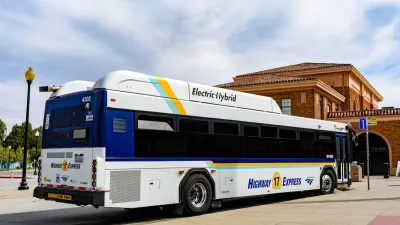Julie Pierce, city of Clayton councilmember, chair of the Contra Costa Transportation Authority, and president of the Association of Bay Area Governments, evaluates the effects of SB 375, California's key land use law to address climate change .
The opening of the editorial:
"I am a city council member, but I am also a regionalist. These are not mutually exclusive titles — each needs the other. Regional governments are built with and depend on the expertise of local officials. Because local government is the level of government closest to the people, we hear firsthand when potholes go unfilled or the garbage is not picked up.
But our residents live in regions. It’s not unusual for someone to make their home in one city but work in a second city, shop in a third and go to a fourth for recreation. Our residents expect their local governments to work together regionally.
Enter SB 375 (Steinberg, Chapter 728, Statutes of 2008), a law that requires a Regional Transportation Plan (RTP) to go beyond existing requirements and meet greenhouse gas emissions reduction targets. Implementing this policy at the regional level made sense to the Legislature because travel patterns could not be addressed on a city-by-city approach; it requires regional cooperation.
SB 375 also recognizes local authority and leverages the symbiotic relationship between local and regional planning. Local plans provide the baseline for all regional plans and investment decisions. Yet at some point, a transportation investment crosses local boundaries: A new bus line is funded, a road is built or a bike lane is created, and the land-use market responds. New homes are built, businesses spring up, and transit and freight routes are altered. Land-use investment drives transportation systems. And transportation investment drives land-use markets."
The article goes on to evaluate the effects of SB 375 according to a number of key considerations.
FULL STORY: The Future of SB 375 Implementation and Regional Planning

Maui's Vacation Rental Debate Turns Ugly
Verbal attacks, misinformation campaigns and fistfights plague a high-stakes debate to convert thousands of vacation rentals into long-term housing.

Planetizen Federal Action Tracker
A weekly monitor of how Trump’s orders and actions are impacting planners and planning in America.

In Urban Planning, AI Prompting Could be the New Design Thinking
Creativity has long been key to great urban design. What if we see AI as our new creative partner?

King County Supportive Housing Program Offers Hope for Unhoused Residents
The county is taking a ‘Housing First’ approach that prioritizes getting people into housing, then offering wraparound supportive services.

Researchers Use AI to Get Clearer Picture of US Housing
Analysts are using artificial intelligence to supercharge their research by allowing them to comb through data faster. Though these AI tools can be error prone, they save time and housing researchers are optimistic about the future.

Making Shared Micromobility More Inclusive
Cities and shared mobility system operators can do more to include people with disabilities in planning and operations, per a new report.
Urban Design for Planners 1: Software Tools
This six-course series explores essential urban design concepts using open source software and equips planners with the tools they need to participate fully in the urban design process.
Planning for Universal Design
Learn the tools for implementing Universal Design in planning regulations.
planning NEXT
Appalachian Highlands Housing Partners
Mpact (founded as Rail~Volution)
City of Camden Redevelopment Agency
City of Astoria
City of Portland
City of Laramie




























